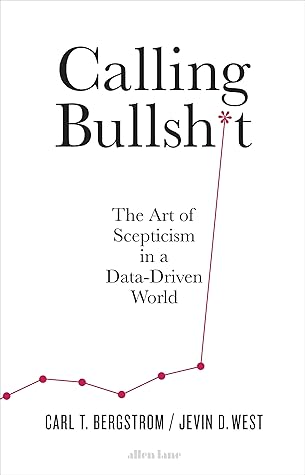More on this book
Community
Kindle Notes & Highlights
Plato complains that the philosophers known as the Sophists are indifferent to what is actually true and are interested only in winning arguments. In other words, they are bullshit artists.
“The amount of energy needed to refute bullshit is an order of magnitude bigger than [that needed] to produce it.”
One recent trend is for parents to experiment with delayed vaccination schedules. This strategy has no scientific support and leaves children susceptible for a prolonged period to the ravages of childhood diseases.
“falsehood flies, and truth comes limping after it.”
(1) bullshit takes less work to create than to clean up, (2) takes less intelligence to create than to clean up, and (3) spreads faster than efforts to clean it up. Of course, they are just aphorisms. They sound good, and they feel “truthy,” but they could be just more bullshit. In order to measure bullshit’s spread, we need an environment where bullshit is captured, stored, and packaged for large-scale analysis. Facebook, Twitter, and other social media platforms provide such environments.
Publicly, Filippo de Strata fretted that that the “brothel of the printing press” would lead readers to cheap, salacious entertainment—the works of Ovid, even. Privately, he may have been more concerned about his own job security.
If religion is the opiate of the masses, Jersey Shore and Temptation Island are the spray canisters from which the masses huff metallic paint fumes.
The newspaper is trying to create a package of stories that together provide as much value as possible. Click-driven media, on the other hand, drives an arms race among headlines.
Outright lies are often straightforward to catch and refute. But effective bullshit is difficult to fact-check. Bullshit can act like one of Latour’s black boxes, shielding a claim from further investigation.
Like Hollywood relationships, spurious correlations fall apart on accelerated time scales.
The more variables you add, the more training data you need.
the curse of dimensionality. If you add enough variables into your black box, you will eventually find a combination of variables that performs well—but it may do so by chance. As you increase the number of variables you use to make your predictions, you need exponentially more data to distinguish true predictive capacity from luck.
If a claim seems too good—or too bad—to be true, it probably is.
Any group adopts wrong ideas at times, and these ideas require forceful public repudiation.
Don’t impute malice when incompetence is a sufficient explanation.
Don’t assume incompetence when an honest mistake can account for error.
more serious rebuttals in your professional life, the presentation is as important as the argument. As we tell our students, effective refutation is hard work. For us, creating a clear presentation often requires creating and refining visualizations, developing a null model, creating a synthetic data set, testing the argument with friends, and double-checking to be sure we are not missing anything.
The bad news is that we can’t possibly do this for every piece of bullshit that we find. Pick your battles. And when you have found your battle, make sure you win it. Do your homework in advance, and be clear in expressing your rationale.
Calling bullshit is not a way to signal your intelligence. Get a MENSA card if that sort of thing is important to you.
A caller of bullshit makes a careful decision about whether it is worthwhile to speak up, derail a conversation, risk a confrontation, or make someone feel defensive. A well-actually guy simply cannot help himself. He hears something he believes he can contradict and doesn’t have the self-control to think first about whether it is helpful to do so.
Confirmation bias can make us more confident than we ought to be, and humility is an important corrective. Self-reflection and an appreciation for the difficulty of getting to the truth: These are the marks of a mature thinker worth trusting.


